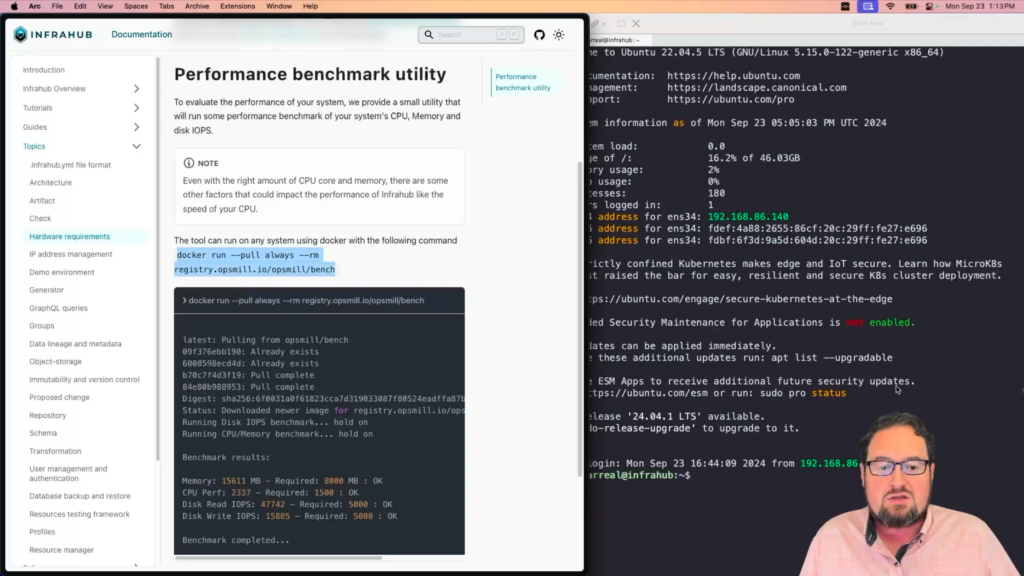Welcome to Infrahub, the platform that unifies all your infrastructure data in one place and streamlines the creation of deliverable services. With built-in data versioning and continuous integration capabilities, Infrahub enhances your automated infrastructure delivery process.
In this video and post below we’ll cover:
- Infrahub’s Hardware Requirements
- Running the Performance Benchmark Utility
- Two Quick Installation Methods for Testing Infrahub
Ready to get started? Let’s go!
1. Infrahub’s Hardware Requirements
Before diving into Infrahub, it’s important to ensure your system meets the necessary hardware specifications for optimal performance.
Minimum Requirements
- CPU: 6 cores
- RAM: 12 GB
- Storage: SSD with at least 5,000 IOPS
Recommended Requirements
- CPU: 8 cores
- RAM: 16 GB
- Storage: SSD with at least 5,000 IOPS
Meeting these requirements ensures that Infrahub can efficiently handle data processing and automation tasks, providing a smooth user experience.
2. Running the Performance Benchmark Utility
To verify that your system aligns with the hardware requirements, you can use the Infrahub Performance Benchmark Utility. This tool assesses your system’s CPU, memory, and storage performance to ensure compatibility.
Benefits of the Benchmark Utility
- Validation: Confirms your system can run Infrahub effectively.
- Insight: Provides detailed performance metrics.
- Preparation: Identifies potential hardware bottlenecks before installation.
To run the benchmark utility, use the following command:
sudo docker run --pull always --rm registry.opsmill.io/opsmill/bench3. Quick Installation Methods for Testing Infrahub
There are multiple ways to install Infrahub for testing purposes. We’ll focus on two methods that allow you to set up Infrahub quickly and start exploring its features.
Method 1: Quick Start with a Single-Line Curl Command
This method provides the fastest way to get Infrahub up and running using Docker. It’s ideal for users who want to test the platform without a complex setup.
Overview
- Ease of Use: Requires minimal commands and configuration.
- Prerequisites: Ensure Docker is installed and running on your system.
- Use Case: Perfect for initial exploration and familiarization with Infrahub.
Command for the quick start installation:
curl https://infrahub.opsmill.io | sudo docker compose -f - up -dMethod 2: Cloning from GitHub and Using Invoke Commands
If you prefer more control over the installation process or wish to delve into the codebase, this method involves cloning the Infrahub repository from GitHub and using Invoke commands to start the platform.
Overview
- Customization: Allows you to interact with the source code and modify configurations.
- Prerequisites:
- Docker installed and running.
- Python 3 with
pipinstalled. - Python packages
invokeandtoml.
- Use Case: Suitable for developers and advanced users interested in testing and contributing to Infrahub.
Commands to clone the repository and start Infrahub:
git clone --recursive --depth 1 https://github.com/opsmill/infrahub.git
cd infrahub
invoke demo.startConclusion
Now that you’re ready to start, head over to our Github where you can find the latest version of our documentation, guides, and more. Also make sure to join our Discord where you’ll find support and a growing community of folks solving complex automation challenges with Infrahub.
Let’s get automating!
Github: github.com/opsmill/infrahub | Discord: discord.gg/opsmill | Documentation: docs.infrahub.app
 Announcing Infrahub 1.0!!
Announcing Infrahub 1.0!!
